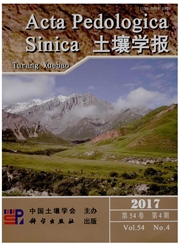

 中文摘要:
中文摘要:
通过对南京市不同土地利用下的土壤容重、孔隙度和土壤水分特征曲线的测定,研究了压实对土壤水分特征参数的影响。结果表明城市土壤存在严重的压实退化现象,土壤容重和孔隙度能够很好地反映土壤的压实程度。随着压实程度的增加,土壤的田间持水量增加,萎蔫点含水量增加,而土壤的最大有效水含量却明显减少。所以,压实土壤对水分的调节能力下降,使其上生长的植物更不容易获得水分供应。
 英文摘要:
英文摘要:
This study took Nanjing as a target area and aimed to establish relationships between compaction and soil water characteristic parameters by determining soil bulk density, porosity and soil water characteristic curves as affected by different land uses, including function zones, vegetation types and years of land use. Function zones were differentiated as residential area, park, campus, road greenbelt in the city zone and vegetable garden in the suburb. Vegetation types included lawn, lawn and tree, arbor and shrub, vegetable and no vegetation. Land-use ages varied from the newly transported soils (used for less than 5 years) to the old soils (used for more than 20 years in the studied areas). Therefore, the studied soils were typical and could show the major soil uses in Nanjing. Bulk density and porosity were selected as the indicators of soil compaction. Water characteristic parameters included field moisture capacity, wilting point moisture content and available moisture content. The results show that urban soils were severely compacted as compared to surrounding suburb soils. The bulk density of most soils in the city exceeded that of normal soils (1.30 g cm^-3). The porosity decreased significantly, especially aeration porosity. Bulk density and aeration porosity were good indicators of soil compaction, showing significant relationship with field moisture capacity. Wilting point moisture content was also related to bulk density and aeration porosity. With the increase in soil compaction degree, field moisture capacity and wilting point moisture content of the soil increased, while potentially available moisture content decreased obviously. So compaction weakens the capacity of soils in regulating water supply and makes plants more vulnerable to drought.
 同期刊论文项目
同期刊论文项目
 同项目期刊论文
同项目期刊论文
 期刊信息
期刊信息
